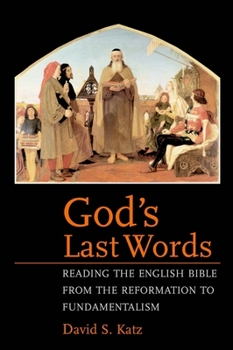God's Last Words: Reading the English Bible from the Reformation to Fundamentalism
Select Format
Select Condition 
Book Overview
This wide-ranging book is an intellectual history of how informed readers read their Bibles over the past four hundred years, from the first translations in the sixteenth century to the emergence of fundamentalism in the twentieth century. In an astonishing display of erudition, David Katz recreates the response of readers from different eras by examining the 'horizon of expectations' that provided the lens through which they read. In the Renaissance,...
Format:Paperback
Language:English
ISBN:030019790X
ISBN13:9780300197907
Release Date:February 2004
Publisher:Yale University Press
Length:416 Pages
Weight:1.27 lbs.
Dimensions:0.8" x 6.1" x 9.2"
Customer Reviews
2 ratings
God's Last Words
Published by Thriftbooks.com User , 15 years ago
The author, David Katz, "holds the Abraham Horodisch Chair for the History of Books at Tel Aviv University." This is not a casual introduction for the novice. The scholarship runs deep and the references in the endnotes are extensive. The book begins with the appearance of being about translations into English of the Christian Bible, and the pursuit of authoritative texts in the original languages. (The preface, with its talk of Jauss and Gadamer and hermeneutics and reader response criticism is a red herring. None of it is explicitly referred to in the book again.) The true focus of the book is on the various Protestant interpretations of the Bible in England and the effect of those interpretations on claims to authoritative original-language texts of the Old and New Testaments, with the second half of the book being more on the growing dismissal of the biblical claims, almost exclusively concerning the early books of the Old Testament, in the ever brightening light of historical, social, and scientific understanding. The book is, as a consequence, uneven. The following excerpt from the Encyclopaedia Britannica will help to clarify my meaning: "The major types of biblical criticism are: (1) *textual criticism*, which is concerned with establishing the original or most authoritative text, (2) *philological criticism*, which is the study of the biblical languages for an accurate knowledge of vocabulary, grammar, and style of the period, (3) *literary criticism*, which focuses on the various literary genres embedded in the text in order to uncover evidence concerning date of composition, authorship, and original function of the various types of writing that constitute the Bible, (4) *tradition criticism*, which attempts to trace the development of the oral traditions that preceded written texts, and (5) *form criticism*, which classifies the written material according to the preliterary forms, such as parable or hymn. "Other schools of biblical criticism that are more exegetical in intent -- that is, concerned with recovering original meanings of texts -- include *redaction criticism*, which studies how the documents were assembled by their final authors and editors, and *historical criticism*, which seeks to interpret biblical writings in the context of their historical settings." From "biblical criticism" in Encyclopaedia Britannica from the Encyclopaedia Britannica 2006 Ultimate Reference Suite DVD. So this book isn't exactly about biblical criticism per se in England, but about the scholarly interpretation of the Bible there and about historical criticism studies of it in the light of science. The author doesn't stick exclusively with England. He refers when needed to German higher criticism, but not in any instructive detail, and he spends quite a few pages on Emanuel Swedenborg and his influence in England. Biblical studies in the United States are excluded till a very brief mention of Fundamentalism in the final four pages of the boo
What Goes Around, Comes Around
Published by Thriftbooks.com User , 20 years ago
This scholarly work will sadly be overlooked by our "Purpose Driven" church culture. The Bible means many things to many people, but we too often forget that it is an interpreted medium, even by those who believe it arrived straight from God's own mouth. David Katz marvelously illustrates how the reading of the Bible has changed its meaning time after time. What modern Christians hold to be timeless and eternal is little more than the current version of an everchaging, constantly evolving faith. For those open to learn this book will be a revelation, and will deepen the appreciation of, and devotion to, the greatest book ever written.






